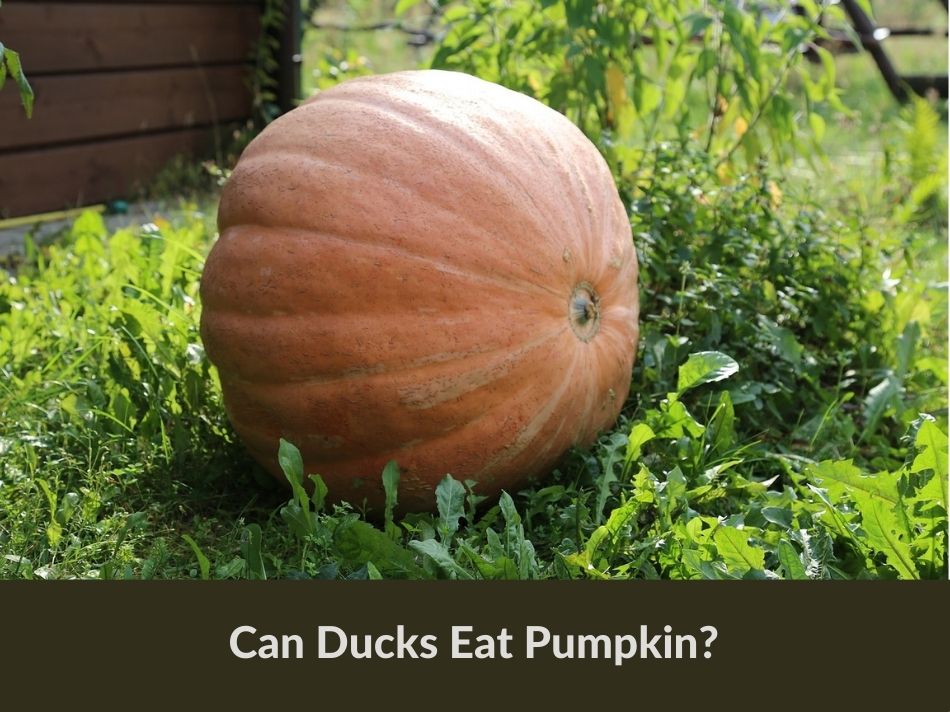Ducks, in their natural habitats, are omnivorous creatures. They often feast on a varied diet comprising small aquatic creatures such as insects, snails, and tadpoles, as well as an array of plants and seeds. Domesticated ducks also relish grains, leafy greens, and occasionally enjoy fruits and veggies as a treat. But, can ducks eat pumpkin?
The answer is a resounding yes! Ducks can indeed eat pumpkin. It’s a delightful treat that not only offers a change of pace but also packs a plethora of vitamins and minerals. Pumpkins are rich in beta-carotene, antioxidants, and essential fibers that are beneficial for our feathered friends.
In this article we will learn more about ducks eating pumpkin and the amazing health benefits that pumpkins can contribute to their diet.
How Often Can I Feed My Ducks Pumpkin?
While pumpkins can be a beneficial treat, moderation is key. Think of it as a tasty snack rather than a meal replacement. Introducing pumpkin to your ducks’ diet once or twice a week is a great way to enrich your ducks palette while also being very healthy.
Can Ducklings Eat Pumpkin?
Ducklings can also partake in the pumpkin fiesta, but with extra care. It’s advisable to wait until they are at least 4 weeks old before introducing pumpkin. Ensure it’s mashed or finely chopped to prevent choking.
Can Duck Eat Pumpkin Seeds?
Yes, ducks can eat pumpkin seeds. These seeds are nutritious, providing essential minerals like manganese. They should be given in moderation and not replace their primary diet. So, when carving your next pumpkin, feel free to share some seeds with the ducks nearby!
Pumpkin Nutritional Value
Below is the nutritional value of one cup pumpkin.
- Calories: 49
- Fat: 0.2 grams
- Protein: 2 grams
- Carbs: 12 grams
- Fiber: 3 grams
It also contains several vitamins and minerals as listed below.
- Vitamin A
- Vitamin C
- Potassium
- Copper
- Manganese
- Vitamin B2
- Vitamin E
- Iron
[Source]
Are Pumpkin Healthy for Ducks?
Absolutely! Beyond the sheer delight of diversifying their diet, pumpkins bring several health benefits to the pond. The rich beta-carotene in pumpkins gets converted to vitamin A in ducks, aiding vision, growth, and immune function.
The seeds, when offered in moderation, act as natural dewormers, helping keep parasites at bay. The fiber content aids in digestion, ensuring a happy duck digestive system. Below are a complete rundown of the health benefit from each mineral and vitamin.
- Vitamin A:
- Crucial for a duck’s vision and immune health, Vitamin A also promotes proper growth and reproductive health. A lack could lead to night blindness or stunted growth.
- Vitamin C:
- While ducks produce some, Vitamin C aids in collagen formation, which is vital for skin, bone, and feather health. It also boosts iron absorption and offers antioxidant benefits.
- Potassium:
- Key for muscle and nerve function, potassium helps maintain a duck’s fluid balance, ensuring hydration and energy whether they’re in ponds or the sky.
- Copper:
- Essential for red blood cell formation, copper boosts bone and nerve health. Adequate copper levels lend ducks vibrant, healthy feathers.
- Manganese:
- A mineral supporting bone development and metabolism, manganese aids enzyme activation, ensuring efficient digestion and nutrient uptake in ducks.
- Vitamin B2 (Riboflavin):
- Vital for energy, Vitamin B2 helps break down proteins, fats, and carbohydrates, giving ducks the vigor they need daily.
- Vitamin E:
- An antioxidant powerhouse, Vitamin E ensures skin and feather health, supports vision, and boosts the immune system, keeping ducks vibrant and alert.
- Iron:
- Foundational for oxygen-carrying blood, iron keeps ducks energetic, enabling long, fatigue-free flights
How To Feed Pumpkin To Ducks
Serving pumpkin to your ducks is a fun activity that can be approached in several ways:
- Raw Pumpkin: Simply cut the pumpkin into manageable chunks and let the ducks nibble away. They might even venture into eating the rind!
- Seeds: Pumpkin seeds can be a hit! You can give them raw or roasted (avoid salt or any other seasonings). They not only enjoy the taste but also benefit from the anti-parasitic properties of the seeds.
- Cooked Pumpkin: Some duck keepers swear by serving their quackers cooked or steamed pumpkin, especially in colder months. It’s softer and easier to consume.
- Pumpkin Puree: Another favorite is pumpkin puree. Just ensure it’s free from added sugars or spices.
- Water: Always to feed them near water to mimic their natural foraging instincts.
Regardless of the method you choose, always remember to remove any uneaten pumpkin after a few hours to prevent it from rotting and potentially harming your ducks.
More Fruit Ducks Can Eat
Ducks loves fruit and below are some more healthy treats you can feed your ducks.
Make sure to check out our full list of fruit ducks can eat.
Conclusion
So, in the vast world of duck cuisine, pumpkins surely have a rightful place. They’re not only delicious (if you’re a duck, of course) but also replete with health benefits. Whether you’re serving up fresh chunks, sprinkling seeds, or dishing out a steaming plate of mashed pumpkin, your ducks are in for a treat.
However, as with all treats, the watchword is moderation. Ensure a balanced diet, and your ducks will waddle their way to happiness!
Quack on, dear reader!
Disclaimer: The information in this article is for informational purposes only. I'm not an expert or a veterinarian.


